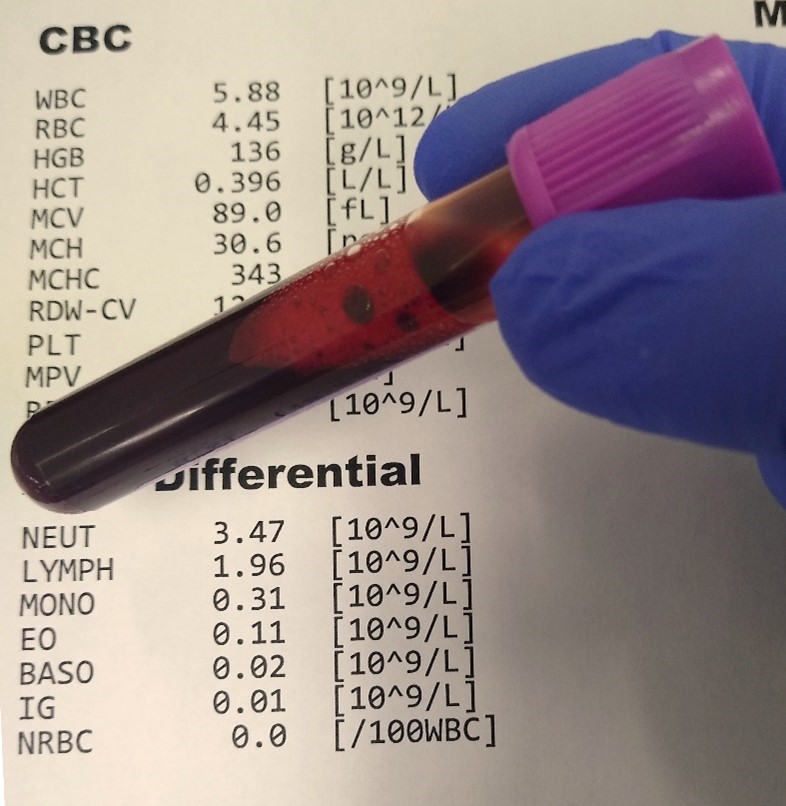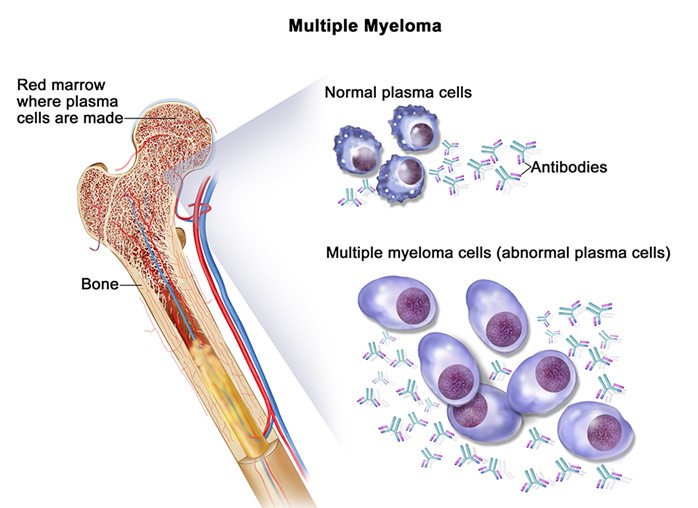A nurse is caring for a patient who has cervical cancer and is receiving chemotherapy that causes anemia and fatigue. The nurse should instruct the patient to report which of the following manifestations that indicate anemia and fatigue? (Select all that apply.)
Pallor and weakness
Dizziness and headache
Shortness of breath and tachycardia
Constipation and abdominal pain
Difficulty sleeping and concentrating
Correct Answer : A,B,C
Choice A reason:
Pallor and weakness are signs of anemia, as they indicate a low level of hemoglobin or red blood cells that carry oxygen to the tissues. Pallor is the loss of color in the skin, especially in the face, nails, and inside of the eyelids. Weakness is the feeling of having less energy or strength than usual.
Choice B reason:
Dizziness and headache are signs of anemia, as they indicate a low level of oxygen in the brain. Dizziness is the feeling of being lightheaded or unsteady. Headache is the pain or discomfort in the head, scalp, or neck.
Choice C reason:
Shortness of breath and tachycardia are signs of anemia, as they indicate a low level of oxygen in the lungs and heart. Shortness of breath is the feeling of not being able to breathe enough or catch your breath. Tachycardia is the abnormally fast or irregular heartbeat.
Choice D reason:
Constipation and abdominal pain are not directly related to anemia or fatigue, but may indicate other conditions such as dehydration, bowel obstruction, or infection. Constipation is the difficulty or infrequency in passing stools. Abdominal pain is the pain or discomfort in the stomach or belly area.
Choice E reason:
Difficulty sleeping and concentrating are not directly related to anemia or fatigue, but may indicate other conditions such as stress, depression, or anxiety. Difficulty sleeping is the trouble falling asleep or staying asleep. Difficulty concentrating is the trouble focusing on tasks or remembering things.
Nursing Test Bank
Naxlex Comprehensive Predictor Exams
Related Questions
Correct Answer is C
Explanation
Choice C reason:
This is the laboratory test that the nurse should monitor for adverse effects of cytarabine, which is an antimetabolite chemotherapy drug that works by slowing or stopping the growth of cancer cells. The main adverse effect of cytarabine is bone marrow suppression, which is the decrease in the production of blood cells, such as red blood cells, white blood cells, and platelets. This can cause anemia, increased risk of infection, and bleeding problems. The nurse should monitor the complete blood count and differential, which measure the number and type of blood cells in a sample of blood. The nurse should report any abnormal results to the provider and provide supportive care as ordered³.
Choice A reason:
These are not the laboratory tests that the nurse should monitor for adverse effects of cytarabine, but rather of cisplatin, which is another chemotherapy drug that can cause kidney damage or failure. Cisplatin can accumulate in the kidney cells and cause oxidative stress and cell death. The nurse should monitor the serum creatinine and blood urea nitrogen levels, which are markers of kidney function that reflect the glomerular filtration rate (GFR). An increase in these levels indicates a decrease in GFR and a loss of kidney function. The nurse should report any abnormal results to the provider and provide fluids and electrolytes as ordered⁴.
Choice B reason:
These are not the laboratory tests that the nurse should monitor for adverse effects of cytarabine, but rather of amphotericin B, which is an antifungal drug that can cause electrolyte imbalance. Amphotericin B can affect the transport of sodium and potassium across cell membranes and cause renal tubular acidosis. The nurse should monitor the serum potassium and magnesium levels, which are important electrolytes for nerve and muscle function. A decrease in these levels can cause muscle weakness, cramps, arrhythmias, and seizures. The nurse should report any abnormal results to the provider and provide supplements as ordered .
Choice D reason:
These are not the laboratory tests that the nurse should monitor for adverse effects of cytarabine, but rather of methotrexate, which is another antimetabolite chemotherapy drug that can cause liver damage or failure. Methotrexate can interfere with the metabolism of folate and cause accumulation of toxic metabolites in the liver cells. The nurse should monitor the serum bilirubin and liver enzyme levels, which are markers of liver function that reflect the liver's ability to process bilirubin and other substances. An increase in these levels indicates liver injury or inflammation. The nurse should report any abnormal results to the provider and provide folinic acid as ordered .

Correct Answer is ["A","B","C","E"]
Explanation
Choice A reason:
Numbness, tingling, or pain in the extremities are signs of peripheral neuropathy, which is a common and serious side effect of thalidomide³. This condition can affect the nerves that control sensation and movement in the arms and legs, and can lead to permanent nerve damage if not treated.
Choice B reason:
Drowsiness, dizziness, or confusion are signs of central nervous system depression, which is a common and serious side effect of thalidomide³. This condition can affect the brain's ability to regulate alertness, cognition, and coordination, and can increase the risk of falls, accidents, and injuries.
Choice C reason:
Constipation, nausea, or vomiting are signs of gastrointestinal distress, which is a common and mild side effect of thalidomide. This condition can affect the digestive system's ability to process food and fluids, and can lead to dehydration, malnutrition, and electrolyte imbalance if not managed.
Choice D reason:
Swelling, redness, or warmth in the legs are not directly related to thalidomide use, but may indicate a deep vein thrombosis (DVT), which is a blood clot that forms in a vein deep in the body. Thalidomide can increase the risk of DVT by affecting the blood's ability to clot normally. A DVT can be lifethreatening if it breaks off and travels to the lungs, causing a pulmonary embolism.
Choice E reason:
Rash, itching, or hives are signs of allergic reaction, which is a rare but serious side effect of thalidomide³. This condition can affect the skin's immune response to the drug, and can lead to severe skin reactions such as StevensJohnson syndrome or toxic epidermal necrolysis if not treated.

Whether you are a student looking to ace your exams or a practicing nurse seeking to enhance your expertise , our nursing education contents will empower you with the confidence and competence to make a difference in the lives of patients and become a respected leader in the healthcare field.
Visit Naxlex, invest in your future and unlock endless possibilities with our unparalleled nursing education contents today
Report Wrong Answer on the Current Question
Do you disagree with the answer? If yes, what is your expected answer? Explain.
Kindly be descriptive with the issue you are facing.
